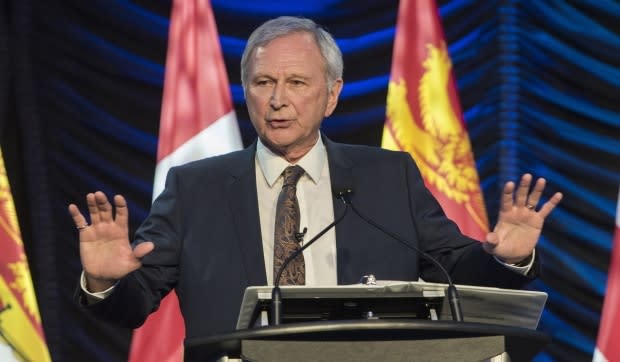New Brunswick files 'strange' arguments in Alberta's carbon tax challenge
The Higgs government's latest legal assault on the federal carbon tax is being labelled "strange" and "poorly done" by one of the lawyers on the other side of the battle.
The province recently filed its arguments in a constitutional challenge to the tax launched by the Alberta government.
In that court filing, New Brunswick complains that it was not able to fully respond to Ottawa's legal position because it didn't have enough time.
That prompted law professor Amir Attaran, who is representing an Alberta First Nation in the case, to contact CBC News to say the province's complaint was unorthodox.
"All of us have had the same amount of time, and nobody, except for New Brunswick, has complained that they weren't given time enough to think through and answer intelligently what the court needs to hear," he said.

The federal arguments had to be filed in Edmonton by Oct. 25, with arguments by other interveners due Nov. 4.
The province says it ran out of time because of tight deadlines and the fact that its document had to be "assembled and couriered from Fredericton to Edmonton to meet the filing deadline," which would leave only two days to analyze federal arguments.
But Attaran and Lisa DeMarco, a lawyer representing another intervener in the case, said there were more than two days.
"The court allowed for filing electronically," DeMarco said. "There were more than two days to get that done."
Even so, DeMarco, who represents an association of large emitters in favour of carbon pricing, acknowledged the case is complex and the amount of work needed on the court filing in a short time is "not insignificant."
The Higgs government refused to comment on the filing Monday.
"We do not comment on cases that are before the courts," said Paul Bradley, a spokesperson for the Office of the Attorney General.
Higgs changes tune
Ottawa imposed its carbon tax, known as the backstop, on New Brunswick and three other provinces in April. The four provinces had refused to implement their own carbon taxes to comply with the federal standard.
But Premier Blaine Higgs declared the day after the Liberals won the Oct. 21 federal election that he would heed voters and start working on a New Brunswick version to comply with Ottawa's requirements.
"People voted for it, so we have to find a way in New Brunswick to make it work," he said then. "The country has spoken."
But three days later, Higgs said the province would continue the legal battle, to clear up whether the federal government can impose a carbon tax on provinces that don't comply with the Trudeau climate plan.
"It's about jurisdictional rights: does the federal government actually have the right to impose this, and what does that mean for future impositions going down the road?" he said.
The Ontario and Saskatchewan governments both filed reference cases in their respective provincial appeal courts to test the constitutionality of the Liberal carbon tax. In both cases, the courts ruled it's within Ottawa's jurisdiction to impose the tax.
Both rulings are now being appealed to the Supreme Court of Canada. In the meantime, the new Alberta government has launched its own reference case.
Attaran, a University of Ottawa law professor representing the Athabasca Chipewyan First Nation in Alberta, said Alberta's government is hoping, if there are enough legal challenges to Ottawa, one of them will eventually succeed.
"If you play the numbers enough, you might get lucky," he said.
Higgs opted to not argue his own reference case in New Brunswick. He said there was no point to doing it because it would involve the same arguments being made in the other provinces.
Attaran says that's why it's strange to see Higgs intervening in Alberta after doing so in Ontario and Saskatchewan.
"For him to say 'I'm going to have a third go in the Alberta Court of Appeal' is not clarifying," he said. "What it's doing is gambling away effort and money that belongs to the province, hoping for a different result. That's not clarifying. That's playing games and wasting resources."
A 'curious metaphor'
Attaran also criticized the substance of New Brunswick's filing in Alberta, including what he called "a curious metaphor" that compares federal and provincial legal jurisdictions to the eating habits and weight classes of professional boxers.
"Some of this goes beyond clever argument and really becomes nonsense, I feel. … The way that New Brunswick is litigating is very poorly done."
New Brunswick also argues that while imposing a carbon tax on provinces is too much meddling in their jurisdiction, national limits on carbon emissions might make sense.
But Attaran said that would represent even more of a federal intrusion on provincial powers.
"All the alternatives [to carbon taxes] that are on the table or even that New Brunswick proposes would be more interventionist," he said. "They would disrupt New Brunswick more than what Ottawa is actually doing."

